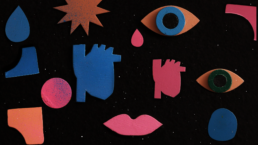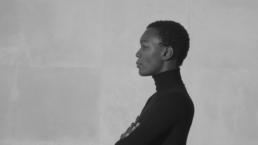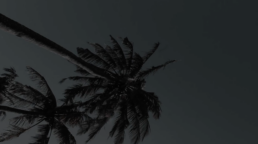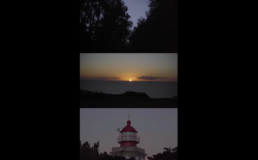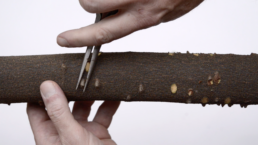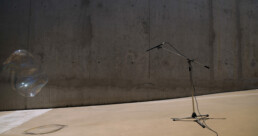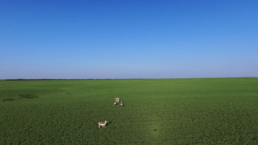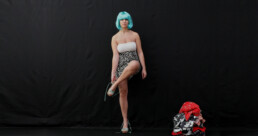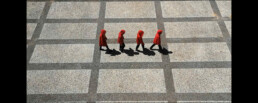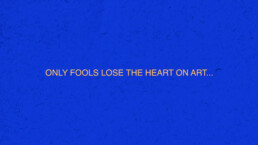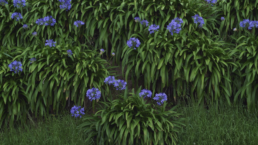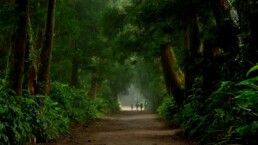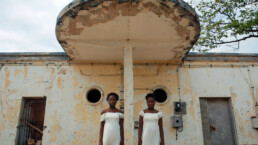FUSO INSULAR 2022 – 27 a 30 de Outubro
28 Outubro, 21h30
Igreja do Colégio – Ponta Delgada
Open Call Fuso Lisboa – Obras seleccionadas
Curadoria de Jean-François Chougnet
O Open Call do festival FUSO é o único concurso de videoarte em Portugal que atribui prémios (aquisição e incentivo). O festival tem recebido um número bastante significativo de candidaturas que, a cada ano, superam largamente as expectativas de todos. Em 2022 foram submetidos 193 vídeos, que consequentemente tornaram muito difícil a tarefa de selecionar as 13 obras que integram o programa da edição deste ano do Festival.
A seleção traduz-se numa paridade estrita: seis mulheres artistas, seis homens artistas, e um coletivo.
Será que esta nossa proposta vai agradar ao nosso público? Esperamos que sim.
Os temas emergem desde a reflexão decolonial, que abre o festival, e outras obras que abordam o mesmo tema de forma por vezes metafórica, até ao excitante regresso de jovens artistas a uma inspiração conceptual, não excluindo o sentido de humor sempre bem-vindo. Outras temáticas, tais como género, paisagem e tecnologia, são também muito relevantes no programa.
Importa destacar o número crescente de artistas estrangeiros a produzir em Portugal, bastante representados nesta edição.
Por fim, uma observação sobre o tempo em que vivemos: os filmes de autoficção inspirados no lockdown da pandemia tornaram-se menos frequentes. Sinal de que estamos a viver para o “aqui e agora”, e que a arte pode existir como um gesto de resiliência e esperança.
Gui Athayde – A ESSÊNCIA DE SER UMA BICHA
Fado Bicha é um projecto que envolve música e activismo, abordando o fado com questões sobre expressão de género e representação da comunidade LGBTI. Neste ensaio visual, Lila Tiago e João Caçador, artistas que criam o projecto, conversam sobre crescer, Portugal, género, fado e identidade bicha.
Hoji Fortuna – CAMINHOS DO MAR
Uma reflexão sobre colonização desumanização, romantização e apagamento históricos.
Sara Carneiro – CAPÍTULO UM: A CHEGADA
Este filme é uma re-imaginação das viagens marítimas realizadas durante a expansão portuguesa. O óleo de motor queimado cria imagens abstractas, e elementos simbólicos como as estrelas, velas e areia contam uma história da travessia do oceano e usurpação de terras. O mar, as paisagens sombrias dos céus nocturnos, os movimentos subtis das nuvens e das ondas relatam a passagem do tempo e a expectativa crescente da chegada. “Capítulo Um: A Chegada” é uma reflexão sobre a história. Uma tentativa de compreender o desenrolar de eventos que criou momentum para que a história fosse moldada. A importância de revisitar o passado, como se pudéssemos mudá-lo, e reescrever a narrativa dos “heróis” e “conquistas” que marcaram uma época. O uso de óleo de motor preto queimado conecta a viagem aos dias de hoje. Este líquido personifica o sistema capitalista, a ganância e a exploração dos recursos naturais, e relembra-nos que o projecto colonial ainda prevalece.
Léna Lewis-King – DE LUZ
Filmado durante o encerramento de 2020, ‘De Luz/Of Light’ explora percepções fugazes e rituais cíclicos das paisagens costeiras portuguesas, especificamente em redor do Farol do Cabo Sardão em Beja, e constrói uma narrativa audiovisual complexa através da colagem de vários ritmos naturais (tais como o sol e o movimento do mar).
José Taborda – DOIS MIL E VINTE
‘Dois mil e vinte’ consiste em duas pessoas a jogar um jogo modificado de quatro em linha. Contudo, as fichas foram especialmente fabricadas em acrílico cristal. Sendo impossível acompanhar a sua posição, e desta forma nunca chegar a um veredicto de vencedor ou vencido. Surge como uma procura de encapsular a sensação constante em tempos recentes. Onde a interactividade e a comunicação foram amplamente alteradas. Contudo também provoca uma sensação de esperança ou adaptabilidade, pois ambos os jogadores, mesmo com condições adversas continuam a jogar como se de um jogo normal se tratasse. Quando o vídeo repete (loop) surge uma nova oportunidade para um desfecho diferente (mas rapidamente atinge o mesmo final). Não apenas associado à questão pandémica, pode ser também experienciado como um exercício sobre percepção e propósito. Se removermos uma característica fundamental de algo, no que se torna?
Marcelo Moscheta – PAU-BRASIL
No vídeo, uma mão vai retirando pouco a pouco cada um dos acúleos (espinhos superficiais) que habitam o tronco do Pau-Brasil. Quando jovem, essa árvore apresenta a cobertura de acúleos que serve muito bem para afastar predadores, funcionando como uma defesa natural até seu crescimento, quando então, deixa cair naturalmente tais defesas e torna-se uma árvore frondosa.
Estreitamente ligada à constituição de nossa nação, por ter sido um recurso explorado à exaustão e de certa forma ter batizado o nome de nosso território, o Pau-Brasil é uma árvore muito pouco conhecida ou mesmo vista nas paisagens brasileiras.
O som da floresta que preenche a atmosfera do vídeo nos primeiros minutos vai dando lugar à um ruído artificial, mecânico ao mesmo tempo em que a presença da floresta e das características naturais da planta vai sendo alterada. Uma ação simples, mas violenta ao extremo, assim como nosso processo civilizatório em que tudo aquilo que definia a identidade dessas terras e nossa cultura ancestral foi sendo suprimida.
Como uma madeira aplainada, sem nuances ou quaisquer imperfeições, continuamos numa eterna disputa entre manter as raízes que nos constituem nação ou render-nos à influências dominantes, globais e estrangeiras, que retiram lentamente o que temos de mais valioso, aquilo que nos dá o próprio nome, nossa cor de brasa verde e amarela, mas vermelha por princípio, porque vem do interior da terra e do interior do ser.
Ricardo Leandro – PURPOSE SOUND
À vez, várias bolhas de sabão entram num espaço público onde existe um microfone. É aqui que lhes é permitido brilhar, onde podem ser admiradas e “ouvidas”, mas a única coisa que iremos ouvir, é o seu fim. A sua durabilidade é breve e fugaz e o espaço volta a ficar vazio, sem mensagens. Quem chega a estes espaços e quem tem algum tipo de exposição, pode usá-lo para um propósito, mas na maioria dos casos, a médio ou a curto prazo, a sua mensagem será efémera e irrelevante face aos seus actos. Esta incontrolável performance de durações variáveis tem o intuito de fazer perceber que, tal como as bolhas, todos se movimentam de formas diferentes num espaço público. Aos olhos do espectador todas estas intervenções terão um fim garantido. Mais importante que o seu percurso até ali, é saber quando será o seu fim, e como é que as próximas bolhas se vão comportar ao chegarem a este espaço público, partindo sempre do princípio que todas partilham o mesmo propósito: rebentar.
Maxime Martinot – OS ANTÍLOPES
“Um dia, nas costas de Marrocos, há cento e cinquenta anos, milhares de antílopes atiraram-se ao mar em conjunto.”
Marguerite Duras
Gabriela Vaz-Pinheiro – VANISHING ACT
Quando desaparecer é existir. Ser uma imagem aos olhos de outrem. Actos de desaparecimento são a impossível viragem de existir em público. Um corpo. Um corpo que é olhado. Uma imagem que pertence a outros. Fugaz e centrífuga.
Depoimentos na primeira pessoa recolhidos anonimamente ao longo do tempo. Tal como as palavras, a performance, executada por Rebecca Moradalizadeh, é deslocalizada para um outro corpo, tornando a experiência transversal, não mais anónima mas no entanto sem nome.
Leonor Sousa – VERMELHO – VÍDEO ENSAÍSTICO
Localização: Marvila, Lisboa, Portugal.
Formas movimentam-se pelo ecrã. Quatro pontos andam sobre o quadriculado.
De um lado, para o outro. O que são? Traçam caminhos, procuram lugares. De um lado, para o outro. Uma busca incessante do percurso a traçar, do movimento a executar. De um lado, para o outro. Projeto desenvolvido em contexto de residência artística LisbonWeek’22, em Marvila, Lisboa, Portugal.
Com a premissa ‘o trabalho’ como tema a explorar na residência, o vídeo procura, através de diversos ensaios, a exploração do movimento criado pelo conjunto de corpos no espaço. Materializa-se visualmente o esforço na execução de uma tarefa assinalada pelo stop-motion.
Júlio F. Costa – WHERE HAVE ALL THE HEARTS GONE?
Um diálogo acerca de corações e vazio.
FUSO INSULAR 2022 – October 27th to 30th
October 28th, 9.30pm
Igreja do Colégio – Ponta Delgada
Open Call Fuso Lisbon – Selected works
Curator Jean-François Chougnet
FUSO festival’s Open Call, launched every year, is the only video art competition in Portugal that gives awards (acquisition and incentive). The festival is receiving a significant, and ever increasing, number of applications, far exceeding our expectations. This year, 193 videos were submitted. It was therefore a very difficult task to select the 13 works that compose the program of this edition of the festival.
The selection observes a strict parity: six female artists, six male artists and one collective.
Will our proposal please our audience? We do hope so.
The themes range from the decolonial reflection that opens the program — other works address this issue, often in a metaphorical way — to the exciting return of young artists with a conceptual inspiration that does not exclude a very welcome sense of humor. Other topics, such as gender, landscape and technology, are also important subject-matters in this program.
It is worth mentioning the growing number of foreign artists producing video art in Portugal, who are therefore present in this edition.
Finally, a note about the time we live in: the autofiction films inspired by the lockdown during the pandemic are less frequent now. A sign that we are living for the ‘here and now’, and that art can exist as a gesture of resilience and hope.
Gui Athayde – THE ESSENCE OF BEING QUEER
“Fado Bicha” is a project that involves music and activism, confronting fado music with issues like gender expression and representation of the LGBTI community. In this visual essay, the project’s creators, Lila Tiago and João Caçador, talk about growing up queer, Portugal, gender, and queer awareness.
Hoji Fortuna – SEA ROUTES
A reflection on colonization, dehumanization, romanticizing and historic erasure.
Sara Carneiro – CHAPTER ONE: THE ARRIVAL
This film reimagines the sea voyages made during the Portuguese expansion. The burnt engine oil creates abstract images, and symbolic elements such as stars, candles and sand tell a story of ocean crossing and land usurpation.
The sea, the somber landscapes of the night sky, the subtle movements of clouds and waves convey the passage of time and the anticipation of arrival.
“Chapter One: The Arrival” is a reflection on history. An attempt to grasp the turn of events that created momentum for history to unravel. The importance of revisiting the past, as if we could change it, and rewrite the narrative of the “heroes” and “conquests” that defined an era. The use of black burnt engine oil connects the voyage to the present day. This liquid embodies the capitalist system, the greed and exploitation of natural resources, reminding us that the colonial project still prevails.
Léna Lewis-King – OF LIGHT
Filmed during the 2020 lockdown, ‘De Luz/Of Light’ explores fleeting perceptions and cyclical rituals of Portuguese coastal landscapes, specifically the ones surrounding the Cabo Sardão Lighthouse in Beja, forging, from collages of various natural rhythms (such as the sun and the motion of the sea), a complex audiovisual narrative.
José Taborda – TWO THOUSAND AND TWENTY
“Two Thousand and Twenty” consists of two people playing a modified Four in a Row online game, although, in this case, the game’s chips were especially manufactured in crystal acrylic, making it impossible to keep track of the player’s position, becoming impossible to reach a verdict of winners or losers. It emerges as a quest to encapsulate the constant sensation in present times, where interactivity and communication have been highly altered.
However, it also provokes a sense of hope or adaptability, as both players, even in adverse conditions, continue to play as if it were a regular game.
When the game restarts (loop) a new opportunity arises for a different outcome (but quickly comes to the same end). Not only associated with the pandemic issue, it can also be experienced as an exercise in perception and purpose. If you remove something’s fundamental characteristic, what does it become?
Marcelo Moscheta – PAU-BRASIL
In the video, a hand gradually removes, one by one, the aculeus (superficial spikes) that inhabit the trunk of the Pau-Brasil tree. When the tree is young, the spikes are very effective in warding off predators, serving as a natural defense while it grows, when they naturally drop and the Pau-Brasil turns into a leafy tree.
The tree is identified with the constitution of our nation, having been a resource exploited to exhaustion. In a way, it was this tree that gave the name to our country. Pau-Brasil is a little-known tree, barely seen in the Brazilian landscapes.
The sound of the forest that fills the atmosphere of the video in the first few minutes gives way to an artificial, mechanical noise, as the natural characteristics of the plant and of the forest change. A simple but extremely violent action, reflecting the “civilizational process” during which everything that defined the identity of these lands and our ancestral culture were suppressed.
Like the making of wood planks, without grooves or any imperfections, we continue in an eternal dispute between keeping the roots that identify us as a nation or surrendering to dominant influences, global and foreign, that slowly erase what we have of most valuable.
Ricardo Leandro – PURPOSE SOUND
One by one, several soap bubbles enter a public space where there is a microphone. This is where they are allowed to shine, where they can be admired and “heard”, but the only thing we will hear is their ending. Their durability is brief and fleeting, and the space becomes empty again, without messages. Those who come to these spaces, and who have some kind of exposure, may use them for a purpose, but in most cases, in the mid or short term, their message will be ephemeral and irrelevant to their actions. This uncontrollable performance of varying durations is meant to make you realize that, just like these bubbles, everyone moves in different ways in a public space. In the eyes of the spectator all these interventions will have a guaranteed end. More important than their trajectory up to that point, is knowing when they will end, and how the next bubbles will behave when they reach this public space, always assuming that they all share the same purpose: to burst.
Maxime Martinot – THE ANTELOPES
“One day, on the Moroccan shores, one hundred and fifty years ago, thousands of antelopes together threw themselves into the sea.”
Marguerite Duras
Gabriela Vaz-Pinheiro – VANISHING ACT
When disappearing is existing. To be an image in the eyes of others. Vanishing acts turn existing in public an impossibility. A body. A body that is being looked at. An image that belongs to others. Fleeting and centrifuge.
First-person statements collected anonymously over time. Like the words, the performance, executed by Rebecca Moradalizadeh, is relocated to another body, where the transversal experience is no longer anonymous but is nevertheless nameless.
Leonor Sousa – RED – VIDEO ESSAY
Location: Marvila, Lisbon, Portugal.
Shapes move across the screen. Four dots move on the checkered pavement. From one side to the other. What are they? They trace paths, they search for places. From one side to the other. An incessant search for the path to be traced, the movement to be executed.
From one side to the other. Project developed in the context of artistic residency LisbonWeek’22, in Marvila, Lisbon, Portugal.
Starting from the premise ‘work’ as the theme to explore while in residence, the video seeks, through several experiments, to explore the movements created by a set of bodies in space. There is a visual materialization, in stop-motion, of the effort placed in performing a task.
Júlio F. Costa – WHERE HAVE ALL THE HEARTS GONE?
A dialogue about hearts and emptiness.
